- Home
- David Downing
Potsdam Station jr-4
Potsdam Station jr-4 Read online
Potsdam Station
( John Russell - 4 )
David Downing
POTSDAM STATION
David Downin
For David Reynolds and Charlie Viney,
who made this series both possible and better
Franco’s furniture
April 6 – 7
As they walked south towards Diedersdorf and the battalion command post, Paul Gehrts realised that he and his companion Gerhart Reheusser were grinning like idiots. The cloudless blue sky, warm sunshine and dust-free easterly breeze were responsible, banishing, if only for a few minutes, the grim anxiety that filled their waking hours. For the moment the occasional rattle of a distant machine-gun, the odd boom of a tank cannon or gun, could be ignored.
About five kilometres behind them, the Seelow Heights fell sharply away to the Oderbruch, the meadowlands which lay between the escarpment and the Oder River. Soon – in a few days, most likely – the men and tanks of the Red Army would storm across those meadows and throw themselves at the German defences. The Russians would die in their thousands, but thousands more would follow. It would only be a matter of time.
But a sunny day was a sunny day, with a power all its own.
The two men were approaching the first houses of the small town when they came upon a large group of soldiers spread out along the side of the road. Few looked older than fifteen, and one boy was actually passing round his army-issue bag of sweets, as if he were at a friend’s birthday party. Most had their panzerfausts lying beside them on the grass, and all looked exhausted – the disposable rocket-launchers were a crippling weight for all but the strongest children. Their troop leader, who was probably almost out of his teens, was examining a weeping blister on one of his charges’ feet. As Paul and Gerhard walked past he looked up, and offered them a brief rueful smile.
Almost all of Diedersdorf’s usual residents had left or been evacuated, and were now presumably clogging the roads leading westward, but the town was not being neglected – in the small central square an overzealous staff-sergeant was supervising another band of young recruits in sweeping the cobbles.
‘The madness of the military mind,’ Gerhard muttered, not for the first time.
As if prove his point, a half-track drove across the square, sending eddies of dust in every direction. The sergeant endured a violent fit of coughing, then ordered his boys back to work.
The division mechanics had set up shop in the goods yard of the town station, close to where a large dug-out had been excavated in the railway embankment for the battalion command post. The corporal at the improvised desk in the goods shed groaned when he saw Paul’s machine-gun. ‘Don’t tell me – it jams.’
‘It does.’
‘How often?’
‘Too often for comfort.’
The corporal sighed. ‘I’ll get someone to have a look,’ he said. ‘Come back in an hour.’
Two bench seats from the nearby railway station had been left outside the battalion command post entrance, offering a place to wait and watch the war go by. The two of them had only been sitting there a few minutes when a captured Red Army jeep pulled up. A Wehrmacht major and two NCOs leapt out, shoved their manacled Russian prisoner onto the other seat, and disappeared into the dugout. He looked like an ordinary rifleman, with dark dishevelled hair and vaguely Mongoloid features. He was wearing a blood-stained kaftan above badly frayed trousers and worse-worn boots. He sat there with his mouth slightly open, his eyes gazing blankly into space.
But he wasn’t stupid. Catching Paul’s look he returned it, and his eyes, once focused, seemed full of intelligence. ‘Cigarette?’ he asked.
That, at least, was one thing the Reich wasn’t short of. Gerhart got up and gave him one, placing it between the Russian’s lips and offering a lighted match.
‘Spasibo.’
‘You’re welcome, Ivan.’
‘No, he fucking isn’t,’ another voice exploded behind them. It was one of the NCOs who had brought him in. He knocked the cigarette from the Russian’s mouth, throwing sparks all over his face, and swung round on Gerhart. ‘What the fuck do you think you’re doing?’
‘What I hope…’
‘Shut the fuck up. And get out of my sight.’ He turned away, grabbed the Russian under one arm and hustled him through the curtained door of the dug-out.
‘Wonderful,’ was all Gerhart said. He looked at the still-swaying curtain, as if contemplating pursuit.
‘Let’s try and find some hot water,’ Paul suggested.
‘I’m not going anywhere,’ Gerhart told him. ‘I’m not going to let a shit like that order me around.’
Paul shrugged and sat down again. There was no use arguing with Gerhart at times like this.
They’d been sitting in silence for about a quarter of an hour when shouting started inside. This went on for several more minutes, and culminated in a gunshot. A few moments later, there was another.
Gerhart leapt to his feet.
‘Let’s go and find that hot water,’ Paul said quietly.
Gerhart spun round, anger in his eyes, but something in his friend’s expression did the trick. He closed his eyes, breathed out heavily, and offered Paul a rueful smile. ‘Okay’ he said. ‘If we both take a bath, the war might stink a little less. Let’s go and find one.’
But they were out of luck. The only hot water in town came complete with a queue, and was already brown. A drink proved easier to come by, but the quality was equally dire, and after scorching their throats with a single glass neither felt hungry for more. They went back to the workshop, but the mechanic still hadn’t got round to checking the machine-gun. Rather than return to their seat outside the command post, they pulled a couple of armchairs out of the empty house next door, and settled down to wait. Paul thought about checking the location of the nearest basement, but found he couldn’t be bothered. The sun was still shining, and it looked like the Red Air Force was having an afternoon off. If worse came to worst, they could simply throw themselves into the dugout across the yard.
Gerhart was devouring a cigarette, angrily sucking in smoke and flicking off ash while he wrestled with his inner demons. He was still pissed off about the Russian prisoner, Paul realised. Which might be admirable, but was unlikely to serve any useful purpose.
Paul had known him a long time. They’d been best friends at their first school, but Gerhart’s father had moved his family to Hamburg when both were nine, and they’d only met up again two years ago, when both were drafted into the same flakhelfer unit at the Zoo Bunker Gun Tower. Gerhart had persuaded Paul that pre-enlistment in the Wehrmacht made sense, partly because he wanted out of the flakhelfer, partly to avoid SS recruitment. Paul had resisted for one reason – the girl he had just fallen in love with was one of those directing the neighbouring tower’s searchlights. But after Madeleine’s mounting took a direct hit he could hardly wait to get away. He and Gerhart had started their compulsory labour service together, and then been called up as seventeen-year-olds when the age limit was lowered early in 1944. They were still gunners, but now they were soldiers of the 20th Panzergrenadier Division.
They had been with their Pak-43 88mm gun for almost a year, somehow surviving the collapse of Army Group Centre the previous summer and the winter battles in Poland. When they had left Berlin for their first Ostfront posting, Gerhart’s mother had taken Paul aside and asked him to look after her son, but if anything he had looked after Paul. Gerhart’s relentless negativity when it came to the war, the army and the Führer was sometimes irritating, but he never let it lessen his sense of duty toward his comrades. In fact, the one probably reinforced the other.
These days, Gerhart was the closest thing Paul had to family. His father Joh
n Russell had deserted him in 1941; his mother Ilse and stepfather Matthias Gehrts had died in a car crash the previous year. His stepsisters were alive as far as he knew, but Paul hadn’t seen them since their evacuation two years ago, and the relationship had never been really close. He hadn’t spoken to his mother’s brother Thomas since their argument about his father almost three years ago.
‘Here he comes,’ Gerhart interjected. A mechanic was walking towards them, the machine-gun over his shoulder.
‘Is it fixed?’ Paul asked.
The mechanic shrugged. ‘Seems to be. I just a filed off a few micrometres. Give it a proper test in the woods – random gunfire this far behind the front makes people nervous.’
Paul hoisted the gun over his own shoulder. ‘Thanks.’
‘No problem.’
They walked back through Diedersdorf’s empty streets. The young recruits on broom duty had vanished, but a Waffen-SS staff car was sitting in the otherwise empty square, and the gruppenführer sitting in the back seat turned a surprisingly anxious pair of eyes in their direction.
‘He’s seen the future, and it’s not looking black,’ Gerhart joked.
The sweet-sucking youths had also moved on, and the road running north was empty. After about a kilometre they turned off into the trees, and followed the winding track to their position on the eastern edge of the wood. The unit’s two cruciform-mounted 88mm anti-tank guns were dug in twenty metres apart, covering the distant Seelow-Diedersdorf road, which curved toward and across their line of vision. The first few Soviet tanks to bypass Seelow would certainly pay for their temerity, but those coming up behind them… well, their fate would depend on whether or not Paul’s unit received another shipment of shells. They currently had nineteen, and two of those would be needed to destroy their own guns.
They’d been here for over two months, and the dug-out accommodation was as spacious as any Paul had known in his short military career, three steps leading down to a short tunnel, with a tiny command post on one side and a small room full of bunks on the other. The ceilings weren’t exactly thick, but they were well-buttressed, and even a direct hit should prove survivable. The half-tracks they needed to move the guns were parked a hundred metres away in the forest, and heavily camouflaged against a sighting from the air. They had fuel enough for sixty miles between them, which seemed unlikely to be enough. Then again, if no more shells were delivered, the guns would become effectively useless, and they could all ride back to Berlin in a single vehicle.
It had been a quiet day, Sergeant Utermann told them. The artillery barrage had been shorter than usual, and even less accurate – nothing had fallen within a hundred metres of their small clearing. There’d been no Soviet air raid, and three Messerschmitt 109s had appeared overhead, the first they’d seen for a week. Maybe things were looking up at last.
‘And maybe Marlene Dietrich came home,’ Gerhart added sarcastically, once they were out of earshot. Utermann was a decent man, but a bit of an idiot.
Out in the clearing Hannes and Neumaier were kicking the unit’s football to and fro. Hannes had found it in a Diedersdorf garden the previous week, and had hardly stopped playing with it since.
‘Shall we challenge them?’ Gerhart asked.
‘Okay,’ Paul agreed without much enthusiasm.
Greatcoats were found for posts, and two men from the other gun team cajoled into making it three-a-side. Paul had played a great deal as a child, and had loved watching his team Hertha. But the Hitlerjugend had turned the game into one more form of ‘struggle’, and he had always gone to the Plumpe stadium with his dad. A wave of anger accompanied that thought, and before he knew it he was almost breaking Neumaier’s ankle with a reckless tackle.
‘Sorry, sorry,’ he said, offering the other boy his hand.
Neumaier gave him a look. ‘What happens to you on a football pitch?’
‘Sorry,’ Paul said again.
Neumaier shook his head and smiled.
The light was starting to fade, but they played on, engrossed in moving the football across the broken forest floor – until the Soviet planes swept over the trees. They were Tupolevs, although right until the last moment Paul was somehow expecting Sergeant Utermann’s Messerschmitt 109s. Like everyone else he dived for the ground, instinctively clawing at the earthen floor as fire and wood exploded above him. He felt a sharp pain in his left leg, but nothing more.
A single bomb, he thought. Turning his head he could see a wood splinter about ten centimetres long protruding from the back of his calf. Without really thinking, he reached back and yanked it out. His luck was in – there was no sudden gush of arterial blood.
Two large trees were in flames on the western edge of the clearing, where Gerhart had gone to collect the ball. Paul counted the figures getting to their feet, and knew that one was missing. He scrambled to his own and rushed across to where his friend should be.
He found Gerhart lying on his back, a shard of wood driven deep into his throat, a bib of blood spread across his chest. Sinking to his knees, Paul thought he caught a flicker in the other’s eyes, but they never moved again.
It seemed at first as if the DC-3 had landed in a forest clearing, but as the plane swung round John Russell caught sight of a long grey terminal building. The legend ‘Moscow Airport (Vnukovo)’ was emblazoned across the facade in enormous Cyrillic letters, beneath an even larger hammer and sickle.
He had expected the Khodynka airfield, which he had last seen in August 1939, decked out with swastikas for the welcoming of Ribbentrop and the signing of the Nazi-Soviet Pact. He had never heard of Vnukovo, and hoped it was closer to the city centre than it looked.
A wooden stairway on wheels was rolled out to meet the plane. It looked like something left over from the siege of Troy, and creaked alarmingly as the passengers stepped gingerly down to the tarmac. The sun was still above the tree line, and much warmer than Russell had anticipated. He joined the straggling procession towards the terminal building, a concrete edifice with all the architectural interest of a British pillbox. The constructivists would be turning in their graves, he thought, and they wouldn’t be alone. As Russell had discovered in 1939, trips to Stalin’s Soviet Union were guaranteed to disappoint those like himself who had welcomed the original revolution.
He joined the end of the queue, thinking that on this occasion a sense of ideological let-down was the least of his worries. First and foremost was the question of whether the Soviets had forgiven him for refusing their offer of hospitality at the end of 1941. After his escape from Germany – an escape which German comrades under Soviet orders had died to make possible – Stalin’s representatives in Stockholm had done their best to persuade him that Moscow was an ideal place to sit out the war. They had even plucked his old contact Yevgeny Shchepkin out of the international ether in a vain attempt to talk him round.
He had explained to Shchepkin that he wasn’t ungrateful, but that America had to be his first port of call. His mother and employer were there, and when it came to raising a hue and cry on behalf of Europe’s Jews, the New York Times seemed a much better bet than Pravda.
What he hadn’t told Shchepkin was how little he trusted the Soviets. He couldn’t even work out why they were so keen to have him on board. Did they still see him and his rather unusual range of connections as a potential asset, to be kept in reserve for a relevant moment? Or did he know more about their networks and ways of operating that he was supposed to? If so, did they care? Would he receive the Order of Lenin or a one-way trip to the frozen north? It was impossible to tell. Dealing with Stalin’s regime was like the English game of Battleships which he and his son Paul had used to play – the only way you found out you were on the wrong square was by moving onto it, and having it blow up in your face.
The queue was moving at a snail’s pace, the sun now winking through the pines. Almost all the arrivals were foreigners, most of them Balkan communists, come to lay gifts at Stalin’s feet. There had been a couple of A
rgentineans sitting across from Russell, and their only topic of conversation had been the excellent shooting in Siberia. Diplomats presumably, but who the hell knew in the violently shuffled world of April 1945? As far as Russell could tell, he was the only Western journalist seeking entry to Stalin’s realm.
For all his apprehensiveness, he was pleased to have got this far. It was seven days since his hurried departure from Rheims in north-east France, the location of the Western Allies’ military HQ. He had left on the morning of March 29th, after receiving off-the-record confirmation that Eisenhower had written to Stalin on the previous day, promising the Red Army the sole rights to Berlin. If Russell was going to ride into his old home town on a tank, it would have to be on a Russian one.
A swift exchange of cables with his editor in San Francisco had given him sanction to switch his journalistic sphere of operations, and, more importantly, some sort of semi-official fig leaf to cover up an essentially personal odyssey. Accompanying the Red Army into Hitler’s capital would prove a wonderful scoop for any Western journalist, but that was not why Russell wanted to do it.
Just getting to Moscow had been complicated enough, involving, as it did, a great swing round the territories occupied by the Wehrmacht, an area which still stretched from northern Norway to northern Italy. Three trains had brought him to Marseilles, and a series of flights had carried him eastwards via a succession of cities – Rome, Belgrade and Bucharest – all with the unfortunate distinction of having been bombed by both sides. He had expected difficulties everywhere, but bribery had worked in Marseilles and Rome, and broad hints that he would put Tito on the cover of Time magazine had eased his entry into Belgrade and, by default, the wider area of Soviet control. The rest had been easy. Once you were in, you were in, and the authorities in Bucharest, Odessa and Kiev had waved him on with barely a glance at his passport or papers. No doubt the various immigration bureaucracies would recover their essential nastiness in due course, but for the moment everyone seemed too exhausted by the war to care.

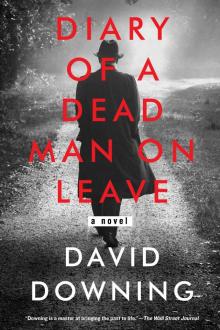 Diary of a Dead Man on Leave
Diary of a Dead Man on Leave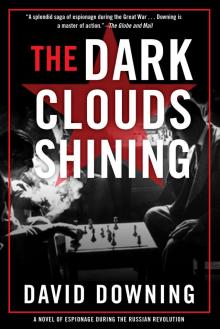 The Dark Clouds Shining
The Dark Clouds Shining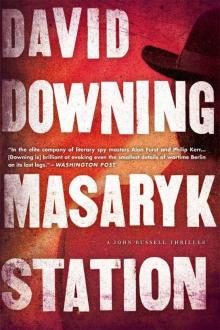 Masaryk Station (John Russell)
Masaryk Station (John Russell)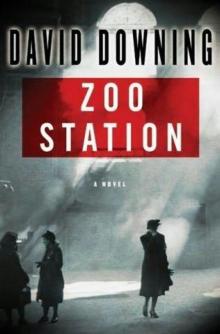 Zoo Stationee
Zoo Stationee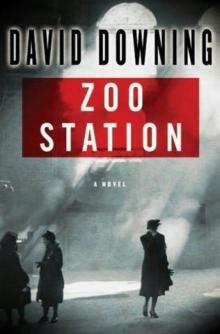 Zoo Station jr-1
Zoo Station jr-1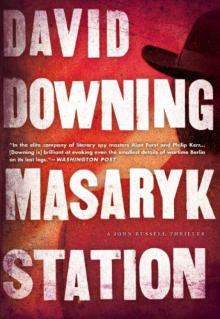 Masaryk Station
Masaryk Station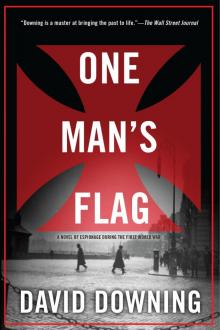 One Man's Flag
One Man's Flag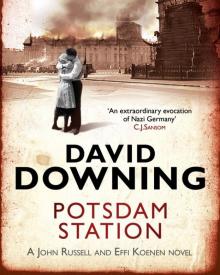 Potsdam Station jr-4
Potsdam Station jr-4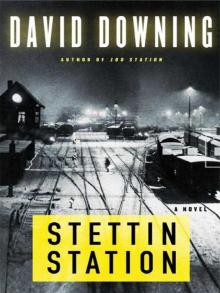 Stattin Station jr-3
Stattin Station jr-3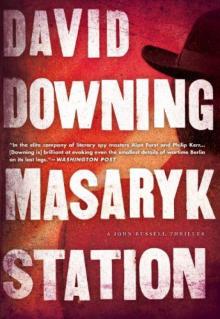 Masaryk Station jr-6
Masaryk Station jr-6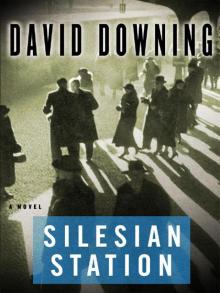 Silesian Station (2008) jr-2
Silesian Station (2008) jr-2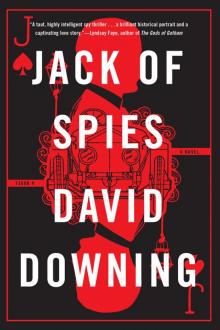 Jack of Spies
Jack of Spies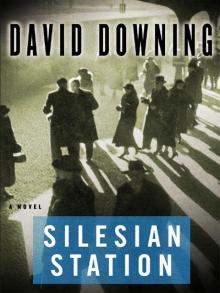 Silesian Station (2008)
Silesian Station (2008) The Moscow Option
The Moscow Option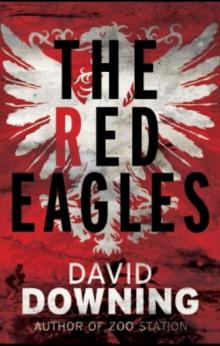 The Red Eagles
The Red Eagles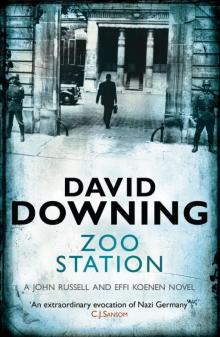 Zoo Station
Zoo Station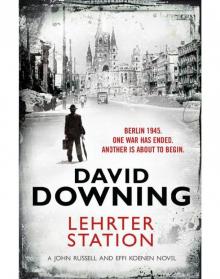 Lehrter Station
Lehrter Station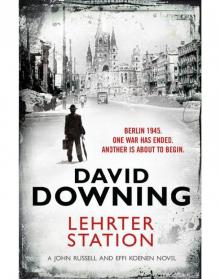 Lehrter Station jr-5
Lehrter Station jr-5